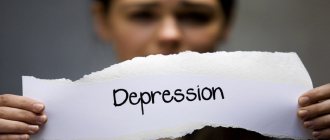Severe depression is characterized by low self-esteem, feelings of guilt and even suicidal thoughts. The physical condition is disturbed: weight decreases (less often - increases), sleep is disturbed, and unpleasant pain occurs in different parts of the body.
In the brain, although temporary, quite pronounced changes occur in the biochemical and physiological processes of nerve cells: disturbances in the ratio of excitation and inhibition processes, changes in the exchange of neurotransmitters, etc.
Getting out of severe depression requires the help of a doctor. Depressive conditions are treated by a psychiatrist and psychotherapist. Only a doctor has the necessary knowledge in the field of psychology, physiology and biochemistry of the body, and knows the mechanisms of development of a depressive state.
Each person with depression has their own individual combinations of causes and mechanisms for the development of a depressive state. The doctor finds them out and accordingly selects treatment tools: medications, diet, rest, sleep, isolation from external stimuli, psychotherapy, physical therapy, etc.
Recent research in the field of neurophysiology has shown that severe depressive conditions are characterized by significant, but often completely reversible changes in brain function and mental state.
The most important thing to know is that depression (even severe) is a reversible condition!
Diagnostics
It is necessary to distinguish severe depression from other forms of the disease. Patients suffering from severe depression often experience bouts of crying and sudden weight loss or weight gain. Patients experience fatigue, have an increased need for sleep, and suffer from chronic pain. An increased need for sleep can be a sign of a nervous disorder. A person ceases to show interest in usual affairs, in his family, he becomes aggressive. Patients often experience suicidal thoughts.
A person suffering from deep depression needs to consult a psychiatrist or psychotherapist who will identify the causes of the disease and select the optimal treatment.
What is depression?
Depression is a mental illness, the main symptoms of which are chronic depression of mood, decreased performance, and loss of interest in life. This disease can manifest itself after difficult life circumstances (loss of a loved one, divorce, lack of money, experienced violence), or it can be a symptom of a somatic illness - hypothyroidism, hormonal disorders, mineral deficiency, etc.
It is important to understand that depression is not a fleeting, insignificant sadness or weakness of character: it is a real disease that involves a violation of the biochemical processes in the brain. This means that if you suspect depression, you need to contact the krachu in time.
Signs
The following are symptoms of severe depression:
- Sleep disorders: difficulty falling asleep at night, insomnia, waking up in the morning, nightmares;
- Feels tired during the day and performance is significantly reduced;
- Inhibited;
- Weight changes: the patient loses weight, or vice versa, weight gain occurs;
- Decreased libido;
- Hallucinations, delusions;
- Reduced self-esteem;
- The patient feels and behaves insecurely;
- Blames himself and expresses self-deprecating ideas;
- A man sees his future in dark colors and bleakly;
- Having thoughts of suicide
If you notice these symptoms, do not delay - the disease will not go away on its own, contact a specialist.
Symptoms
Most often, a person suffering from chronic depression seems to people to be a dissatisfied character with a bad character who is not happy with everything around him for no apparent reason. You should think about depression if:
- there are risk factors - chronic lack of sleep, fatigue, nervous work, difficult family situation, caring for a sick relative;
- symptoms in the form of tearfulness, constant depression, and a pessimistic outlook on life appeared relatively recently and have not been observed since early childhood;
- problems with physical condition appeared - headaches, decreased performance, sleep and appetite disturbances, pain in the heart, abdominal pain, which cannot be explained by somatic pathology during examination.
Symptoms of chronic depression may occur to greater or lesser extent from time to time. For example, becoming less noticeable after some rest. There is some improvement and deterioration in well-being, replacing each other. If you notice fluctuating occurrences of the following conditions, consider seeing a therapist:
- anhedonia - rarely any positive emotions arise, there are no pleasant sensations from simple things like delicious food, relaxation, sunny weather;
- apathy - lack of desire to do anything besides the most important responsibilities, avoidance of meetings with friends, travel, lack of desire to take care of oneself and the home, study, desire to spend more time at home in solitude;
- negativism – patients indicate that everything annoys them;
- feelings of guilt, helplessness, uselessness, hopelessness, low self-esteem, a feeling of inability to change something, which can lead to a suicide attempt;
- symptoms of mental and motor retardation, difficulty concentrating, difficulty performing difficult intellectual actions, fatigue, forgetfulness, absent-mindedness;
- somatic symptoms - headaches, dizziness, weakness, decreased libido, insomnia, decreased appetite, pain in muscles, joints, heart, abdomen and other organs; osteochondrosis, arterial hypertension of unknown origin;
Treatment of severe depression
It is advisable to begin treatment of severe depression with the weakening and relief of the main symptoms.
The use of antidepressants brings a noticeable improvement in condition and mood. In severe cases, drug treatment in a hospital is necessary. The most effective use of pharmacotherapy is in combination with psychotherapy. Psychotherapy can be carried out in group, individual and family forms.
New treatments such as biofeedback and transcranial magnetic stimulation are also effective for major depression.
In addition to the main treatment, restorative therapy is indicated: walks in nature, massage, etc. The approach to the patient plays a huge role. Patients often show irritation and anger. It is very important that a person with depression receives proper treatment from a doctor.
| | Find out more: How is severe depression treated in a hospital? |
We can help you! Call us
Treatment
Good treatment begins with a thorough diagnosis. The first stage is a consultation with a psychotherapist or psychiatrist. The doctor pays attention not only to what the person says, but also to his gestures, facial expressions, and movements. The patient undergoes a series of psychological tests. This is necessary to assess the functionality of the cognitive sphere. Further laboratory tests may be carried out.
Treatment of depression is a combination of medication and psychotherapy. The process is long and difficult. It is strictly forbidden to stop prescribed medications on your own. In this case, the risk of suicide increases, and symptoms can worsen. In acute conditions, hospitalization will be required to monitor the patient and his health.
Medication methods
The medication method involves careful planning of a specific dosage of drugs for a specific person. Doctors make a prescription from a combination of necessary medications. In the treatment of deep, protracted depression, one cannot do without the following groups of drugs:
- antidepressants - normalize mood, smooth out the feeling of helplessness and gloominess of the world;
- tranquilizers - relieve anxiety, improve sleep, have a calming effect;
- nootropic drugs improve blood flow and correct cognitive problems;
- sometimes antipsychotics are prescribed, especially in the presence of psychotic manifestations;
- vitamins for general strengthening of the condition;
- mood stabilizers - eliminate sudden mood swings.
Tricyclic antidepressants and selective serotonin reuptake inhibitors are aimed at normalizing neurotransmitters in the body. Pharmacological agents are necessary to restore hormonal balance.
The doctor develops a drug treatment plan, taking into account the patient’s current and past condition, the parameters of his body, and the risks of side effects. The therapeutic effect of the drugs is not achieved immediately - it will take from 3 to 6 months. Drug therapy is a relief method that relieves painful symptoms. Then it is important to attend psychotherapy.
Psychotherapy
Lack of complexity in the treatment of depression will not give results and recovery. If a patient undergoes only pharmacological treatment, he does not develop mechanisms for coping with his own emotional state. He does not realize and does not understand the psychological reasons for the onset of the disease.
Only drug treatment leads to a rapid relapse. Therefore, psychotherapy is an important component of treatment. Psychotherapists and clinical psychologists use the following methods:
- psychodynamic therapy helps to understand and eliminate intrapersonal conflicts;
- family therapy - joint consultations between the patient and his family members, the psychotherapist helps to correct pathological patterns of behavior among relatives;
- The cognitive-behavioral approach helps to return a person to real life, to understand the situation and the need for further treatment;
- Cognitive behavioral therapy is a proven method aimed at transforming patterns associated with depressive disorder;
- mindfulness and mindfulness practices correct cognitive problems, develop observation skills, healthy reflection, and skills to monitor one’s own feelings and thoughts.
The patient is required to comply with the recommendations of the attending physician and clinical psychologist. Psychotherapy helps reduce the risk of relapse and achieve recovery.
Self-medication
Independent attempts to overcome mental pathologies often end in failure. Patients with depression perceive failures harshly. Because of this, the situation worsens and the symptoms worsen.
It is unacceptable to take medications on your own, based on articles on the Internet or advice from friends. Self-medication is only relevant in combination with drug therapy prescribed by a doctor and psychotherapy.
At the beginning of treatment, the patient is unable to find the strength to take care of his own well-being. But after several months of qualified treatment, a person already finds the strength to take an active position. Self-help includes:
- taking care of proper nutrition, quality sleep;
- taking medications prescribed by your doctor on time in the described dosages;
- engaging in non-physically strenuous sports - yoga, walking, swimming;
- taking care of personal hygiene.
It wouldn't hurt to educate yourself on the topic of what depression is. Reading scientific, proven sources about the disease helps. It is also recommended to try to focus on positive things. One of the simple psychotherapeutic self-help techniques: create a list of actions, people and locations that cause at least a little inner well-being. You should try to do things that have a positive effect on your well-being and exclude unfavorable people from your social circle.
It is important to try to be active: look for a new hobby, join a support group for people with depression, monitor your own feelings, volunteer.
Complications of depression
If clinical depression is neglected, the following complications may arise:
- Brain tumors;
- Somatic disorders;
- Hormonal disorders;
- Multiple sclerosis;
- Loss of work, study, complete loneliness;
- Suicide.
According to statistics, depression is the most common cause of suicide worldwide. Treatment must be comprehensive and timely.
Classification and stages
The disease is classified according to severity, divided into mild, moderate and severe. The latter may be accompanied by psychosis.
In the first and second degrees of severity, the patient’s ability to work is maintained, but the quality of life noticeably deteriorates. In severe cases, characteristic symptoms are clearly expressed: fatigue, bad mood, decreased ability to work, thoughts of suicide.
The disease is divided into three types:
- chronic;
- recurrent (repeating);
- episodic.
A third of patients are susceptible to a chronic form of the disease, in which a person experiences a depressive disorder for 2 or more years.
The causes of depression are divided into three groups:
- Endogenous. A person suffers from manic-depressive psychosis, which occurs rapidly and involves alternating between manic and depressive states. Most often, this disease is hereditary.
- Exogenous. Occurs as a result of exposure to acute or chronic stress.
- Somatogenic. Interrelated with previous diseases, such as heart attack, head injuries, pathologies of an oncological nature, stroke.
Some patients are prone to seasonal disorders. Mostly symptoms of the disease occur in the autumn and last throughout the winter months.
Causes of the condition
Depressive disorder can occur due to the following reasons:
- Dramatic experiences caused by a difficult life situation. The disease can occur after the loss of a loved one, betrayal, divorce, bullying, and so on;
- Development of depressive beliefs due to moral trauma in childhood. Children who have experienced domestic violence, bullying and other terrible life circumstances face persistent emotional oppression as adults;
- Autogenic depression occurs without exposure to an external stimulus;
- Taking certain medications, such as antipsychotics;
- Women may become depressed after giving birth.
In psychiatric practice, there are cases when patients experience this disorder in “periods.” Some people call this phenomenon seasonal depression: due to a lack of sunlight in the autumn-winter period, a person may experience persistent depression. Regardless of the reasons, this condition requires high-quality professional treatment.
Consequences of depression
Depression has social and physiological consequences. This means that high-quality treatment is necessary: otherwise, a person’s life can turn into a complete nightmare, or even end in one moment.
Diseases
Because of this disorder, not only the psychological, but also the physical state of a person deteriorates. There are:
- Migraine;
- Arthritis;
- Alcohol or drug addiction;
- Sexual dysfunctions;
- Diabetes;
- Diseases of the nervous and cardiovascular system;
- Depression in a pregnant woman leads to organic changes in the fetal brain.
General state
Due to depression, a person may enter into conflicts with loved ones, isolate himself from everyone, and ultimately be left alone. Problems with performance lead to lack of success in school and in the workplace, exclusion from education, and dismissal from work.
The worst consequence of depression is suicidal behavior. According to statistics, patients with depressive disorder are at the highest risk of suicide. In this case, a person can both prepare for suicide and commit it impulsively, during an attack of despair. To prevent such a terrible outcome, you need to contact a specialist in a timely manner; It is recommended to undergo therapy in a hospital.
Types of depression in psychiatry
Depression includes a complex of somatic and psychological syndromes. There are several types of this disorder, which differ from each other in the characteristics of their clinical picture.
Classical
A classic depressive episode lasts from several weeks to one year. The complex of classical syndromes affects not only mood, but also performance. A person experiences stiffness of movement, apathy, impaired concentration and even mental functions. After the initial episode, depression may return.
Psychiatric
Any type of depression is a mental disorder. General restorative procedures and occupational therapy, contrary to what some people believe, do not help get rid of long-term oppression! You should contact an experienced psychiatrist.
Moderate
Moderate depression is accompanied by a persistent decrease in mood and performance, but does not include suicidal tendencies. Despite its moderate severity, such a disorder in any case requires professional help.
Heavy
Severe, progressive depression includes the following symptoms:
- Loss of interest in life;
- Lack of self-esteem;
- Unreasonable feelings of guilt;
- Persistent feelings of grief and depression;
- Suicidal thoughts, self-aggressive behavior.
Expressed
Severe depression is accompanied by lethargy, lethargy, and decreased mental function. Outwardly, the person is unkempt, speaks quietly, and has a mournful expression on his face.
Chronic
Depression can become chronic if it is not treated in time. In addition, with somatic diseases such as hypothyroidism, depressive episodes occur periodically.
Acute
During an exacerbation, a person experiences overwhelming sadness. Depression of mood can have a chronic form: it becomes a kind of “norm of life” for a person. During an exacerbation, a person can commit suicidal actions: it is necessary to provide the person with timely psychoneurological assistance.
Atypical
Atypical depression occurs in a hidden form. A person feels depressed, but this does not stop him from joking and laughing; there is a high appetite. It is difficult to determine this type of disorder; it is more common in men.
Recurrent
In recurrent disorder, depressive phases alternate with periods of normal mood. Recurrent depression develops in childhood and periodically manifests itself in adulthood.
Agitated
This type of depression includes low mood and anxiety. In this case, a person feels irrational anxiety, general depression is accompanied by periodic panic attacks. A person develops obsessive phobias and typically expects the worst outcome of any event.
Resistant
An obligatory sign of resistant depression implies the ineffectiveness of pharmacotherapy. Several courses of medication may not provide significant improvement. Antidepressants may have insufficient clinical effect. In this case, the patient must be under the constant supervision of a doctor.
Pathogenesis
The main role in the development of depression is played by changes in neurotransmitter activity that occurs in the neurons of the brain. As a result, the production and interaction of mediators: serotonin, norepinephrine and dopamine are disrupted.
With a lack of serotonin, a person experiences irritability and aggression towards others. Sleep and appetite are disturbed, there is no interest in intimate relationships, and the pain threshold decreases. A lack of norepinephrine causes rapid fatigue, a person experiences apathy, lacks initiative and has poor concentration.
With dopamine deficiency, changes in thinking and motor function are observed. A person does not receive satisfaction from relaxation, sexual intimacy, communication with friends, or favorite foods. Loses any interest in learning and self-knowledge.











